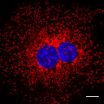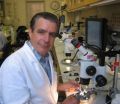You are what your father ate too
2010-12-24
(Press-News.org) We aren't just what we eat; we are what our parents ate too. That's an emerging idea that is bolstered by a new study showing that mice sired by fathers fed on a low-protein diet show distinct and reproducible changes in the activity of key metabolic genes in their livers. Those changes occurred despite the fact that the fathers never saw their offspring and spent minimal time with their mothers, the researchers say, suggesting that the nutritional information is passed on to the next generation via the sperm not through some sort of social influence.
The new findings reported in the December 23rd issue of Cell, a Cell Press publication, add to evidence that epigenetic reprogramming of genes may be an important mechanism for passing information about the environment, and in this case the nutritional environment, from one generation to the next. Epigenetics refers to heritable chemical modifications to DNA that can alter the way genes are expressed without changing the underlying sequence of their As, Gs, Ts and Cs.
"The take away is that we are more than just our genes," said Oliver Rando of University of Massachusetts Medical School, "and there are many ways our parents can 'tell' us things."
Rando said the notion that what our fathers and grandfathers ate can influence our metabolism isn't new. Perhaps the best evidence in humans comes from epidemiological studies showing that if your paternal grandfather went hungry, then you will be at greater risk of developing obesity and cardiovascular disease. Earlier this year, a study in rats by another team found that fathers on a high-fat diet can pass health problems on to their daughters.
In the new study, the researchers wanted to test whether environmental conditions have transgenerational effects by screening the activity of genes in mice whose fathers were fed on a low-protein diet from the time they were weaned until they reached sexual maturity. It turned out that hundreds of genes changed in the offspring of those protein-starved males. Epigenomic profiling of the young mouse livers showed numerous differences depending on paternal diet, including chemical modification of a sequence of DNA that is thought to serve as an enhancer for the key lipid transcription factor known as Ppara. Those changes were associated with lower activity of the Ppara gene."It's consistent with the idea that when parents go hungry, it's best for offspring to hoard calories," Rando said, noting the transcription factor's role in controlling cholesterol and lipid synthesis in the liver.
However, he says it isn't yet clear whether the changes in cholesterol metabolism will prove advantageous in the context of a low-protein diet, although it's a tempting idea.
They aren't sure yet how the information is encoded and passed from father to offspring either. It isn't obvious in that the sperm don't show the same epigenetic pattern seen in the livers of the offspring.
One thing is clear. The new findings in combination with other evidence have important implications for future studies and their mice now offer a useful model for working out the mechanisms responsible for transgenerational reprogramming of metabolism.
"Together, these results suggest rethinking basic practices in epidemiological studies of complex diseases such as diabetes, heart disease, or alcoholism," the researchers wrote in conclusion. "We believe that future environmental exposure histories will need to include parental exposure histories as well as those of the patients to disentangle induced epigenetic effects from the currently sought genetic and environmental factors underlying complex diseases. Our observations provide an inbred mammalian model for transgenerational reprogramming of metabolic phenotype that will enable dissection of the exposure history necessary for reprogramming and genetic analysis of the machinery involved in reprogramming, and they suggest a number of specific pathways likely to be the direct targets of epigenetic reprogramming."
Rando is curious to see what happens in the next generation of mice. "The human studies suggest that it is grandchildren who are most affected by their grandparents' exposure histories," he says.
###
Want more research news from Cell Press? Go to: http://www.eurekalert.org/jrnls/cell/pages/index.php
END
ELSE PRESS RELEASES FROM THIS DATE:
2010-12-24
LA JOLLA, Calif., December 23, 2010 – Melanoma is one of the least common types of skin cancer, but it is also the most deadly. Melanocytes (pigment-producing skin cells) lose the genetic regulatory mechanisms that normally limit their number, allowing them to divide and proliferate out of control. One such regulator, called MITF, controls an array of genes that influence melanocyte development, function and survival. Researchers at Sanford-Burnham Medical Research Institute (Sanford-Burnham) and their collaborators recently used a melanoma mouse model, cell cultures and ...
2010-12-24
Tomato plants use similar biochemical mechanisms to reject pollen from their own flowers as well as pollen from foreign but related plant species, thus guarding against both inbreeding and cross-species hybridization, report plant scientists at the University of California, Davis.
The researchers identified a tomato pollen gene that encodes a protein that is very similar to a protein thought to function in preventing self-pollination in petunias. The tomato gene also was shown to play a role in blocking cross-species fertilization, suggesting that similar biochemical ...
2010-12-24
BOSTON--By tweaking a single gene, scientists have mimicked in sedentary mice the heart-strengthening effects of two weeks of endurance training, according to a report from Dana-Farber Cancer Institute and Beth Israel Deaconess Medical Center (BIDMC).
The genetic manipulation spurred the animals' heart muscle cells -- called cardiomyocytes -- to proliferate and grow larger by an amount comparable to normal mice that swam for up to three hours a day, the authors write in the journal Cell.
This specific gene manipulation can't be done in humans, they say, but the findings ...
2010-12-24
Use of electronic health records by hospitals across the United States has had only a limited effect on improving the quality of medical care, according to a new RAND Corporation study.
Studying a wide mix of hospitals nationally, researchers found that hospitals with basic electronic health records demonstrated a significantly higher increase in quality of care for patients being treated for heart failure.
However, similar gains were not noted among hospitals that upgraded to advanced electronic health records, and hospitals with electronic health records did not ...
2010-12-24
LA JOLLA, CA—Researchers at the Salk Institute for Biological Studies have discovered how AMPK, a metabolic master switch that springs into gear when cells run low on energy, revs up a cellular recycling program to free up essential molecular building blocks in times of need.
In a paper published in the Dec. 23, 2010 edition of Science Express, a team led by Reuben Shaw, PhD., Howard Hughes Medical Institute Early Career Scientist and Hearst Endowment assistant professor in the Salk's Molecular and Cell Biology Laboratory, reports that AMPK activates a cellular recycling ...
2010-12-24
Phosphorous levels plummet in kidney disease patients who stick to a vegetarian diet, according to a study appearing in an upcoming issue of the Clinical Journal of the American Society Nephrology (CJASN). The results suggest that eating vegetables rather than meat can help kidney disease patients avoid accumulating toxic levels of this mineral in their bodies.
Individuals with kidney disease cannot adequately rid the body of phosphorus, which is found in dietary proteins and is a common food additive. Kidney disease patients must limit their phosphorous intake, as high ...
2010-12-24
WORCESTER, Mass. — Scientists at the University of Massachusetts Medical School and the University of Texas at Austin have uncovered evidence that environmental influences experienced by a father can be passed down to the next generation, "reprogramming" how genes function in offspring. A new study published this week in Cell shows that environmental cues—in this case, diet—influence genes in mammals from one generation to the next, evidence that until now has been sparse. These insights, coupled with previous human epidemiological studies, suggest that paternal environmental ...
2010-12-24
The cell signaling pathway known as Wnt, commonly activated in cancers, causes internal membranes within a healthy cell to imprison an enzyme that is vital in degrading proteins, preventing the enzyme from doing its job and affecting the stability of many proteins within the cell, researchers at UCLA's Jonsson Comprehensive Cancer Center have found.
The finding is important because sequestering the enzyme, Glycogen Synthase Kinase 3 (GSK3), results in the stabilization of proteins in the cell, at least one of which is known to be a key player in cancer, said Dr. Edward ...
2010-12-24
FINDINGS: Whitehead Institute researchers have determined that heat shock protein 90 (Hsp90) can create diverse heritable traits in brewer's yeast (Saccharomyces cerevisiae) by affecting a large portion of the yeast genome. The finding has led the researchers to conclude that Hsp90 has played a key role in shaping the evolutionary history of the yeast genome, and likely others as well.
RELEVANCE: Over the past several years, Whitehead Member Susan Lindquist has built the case that heat shock proteins (Hsps), which are found across species from bacteria to humans, are ...
2010-12-24
When prowling for a hook up, it's not always the good-looker who gets the girl. In fact, in a certain species of South American fish, brawn and stealth beat out colorful and refined almost every time.
In a series of published studies of a South American species of fish (Poecilia parae), which are closely related to guppies, Syracuse University scientists have discovered how the interplay between male mating strategies and predator behavior has helped preserve the population's distinctive color diversity over the course of time. The third study in the series was published ...
LAST 30 PRESS RELEASES:
[Press-News.org] You are what your father ate too

